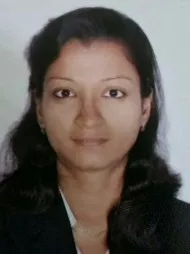
Advocate Umesh Chary
Advocate Umesh enrolled with the Bar Council of Maharashtra & Goa in 2009. He is a member of the Bombay Bar Association.
Enrollment Number : MAH/181/2009
- Bombay High Court
- Family Courts, Mumbai
Recently Contacted Lawyers in Mumbai

Advocate Sunita Bafna

Advocate JV Bhosale

Advocate Vanita Yogesh Orpe

Advocate Sarthak Shah

Advocate Ashvin Khillare

Advocate Hari Shankar Verma

Advocate Vibhuti Agrawal

Advocate Zainab Inamdar

Advocate Siddhartha Shah
Popular Reviews
There are no reviews yet for Advocate Umesh Chary. Please consult the lawyer through LawRato if you wish to leave a review.
Questions Answered by Advocate Umesh Chary
Q: Correction of address in registry
I have purched flat on second floor but i got stilt first floor in registry address. i want to correct it what can i do
Advocate Umesh Chary answered
Confirmation deeds are also known as correction deeds. They are entered into between parties to rectify any errors made in a previous deed. These errors may include typing error, misspelt name, error in property description, or any other error in execution of the documents. These mistakes can be later corrected through a deed of confirmation. A confirmation deed means assent to the estate already created. By the confirmation, the parties further strengthen and give legal validity to the estate. A person may confirm and assent documents of conveyance executed by another personIt may so happen that a party to a document has made a mistake while signing the main document or has failed to admit the execution before the sub-registrar within the prescribed time. As such, a sub-registrar may refuse to register the document. Or else the parties may have executed the documents, but failed to register at a sub-registrar's office to admit execution, and the registering authority may refuse to register the document. In order to remedy these defects, a deed of confirmation has to be executed by the party concerned, where he confirms the execution of principal deed and further adds that the principal deed is valid and binding on him. He also confirms that he has no right, interest, or title to the property transferred which belongs to the purchaser/transferee. Also, a copy of the principal deed should be annexed to the deed of confirmation. The copy should also be signed by the party executing the confirmation deed. This avoids execution of fresh documents, payment of stamp duty and registration charges. The Indian Registration Act recognises confirmation deeds. According to Section 17 of the Act, any deed confirming any interest in immovable property needs to be registered. The confirmation may be given either by acquiescence , by limitation, or by deeds. A confirmation deed attracts stamp duty. In case the main document is registered or to be registered, the corresponding confirmation deed also requires registration. These deeds are separate and distinct from cancellation deeds. It may so happen that there may be certain written documents, which by their nature or by operation of law, are either void or voidable under certain circumstances. These documents may be against the interest of some party. There may be documents of contract that are void as they are either against the law. In such cases, the parties to the document may cancel the documents by mutual consent. An agreement for sale, mortgage, lease, partition, licence etc may be cancelled with consent of all parties involved in the transaction. In case the parties do not have mutual consent, the affected party needs to seek the intervention of the Court by filing a suit under Section 13 of Specific Relief Act.
Q: Procedure to transfer Jointly registered flat back to sole ownership
I have purchased flat in 2014 within PMC areas. Though it's me who has purchased it and have been paying the 100% EMIs , I had registered it with mother as a joint owner for some reasons. But now I would like to have it transferred it back to my name 100% and also my mother is ok with it as She knows it's me who has been paying for it 100% . How much stamp duty or taxes I will have to pay for this gift deed? Let's assume as per the current ready recline rates , value is 55 lakhs. Also if my mother can have a will for this flat then is it enough? And in this case vI avoid expenses involved for gift deed?
Advocate Umesh Chary answered
It is better to go for gift deed because property is in joint name, it also saves stamp duty. You both also can execute rights relinquish deed. I think in maharastra there is nominal stamp duty for both..
Q: Legal procedure to file a case of cheque bounce
Dear Sir I have been given cheque by my friend of 9 lac rupees which has bounced on 15Jan 2018. Earlier I had given a amount 7 lac to a person who was introduced to me by my friend. Now my friend has my 7 lac rupees which he is not returning beneficiary giving amount back. Can I file 138 on my friend .
Advocate Umesh Chary answered
Firstly, you will have to send the issuer of cheque demand notice for the cheque amount within 30 days of cheque bounced.Secondly, if the issuer of cheque fails to pay the cheque amount within 15 days of the above demand notice, then a complaint must be made to the Magistrate/ Metropolitan magistrate within 30 days of above non payment.Issue regarding where the complaint will be filed- The complaint has to be filed to the Magistrate/ Metropolitan Magistrate within the jurisdiction where your bank falls. Kindly note that time is the essence to file a case for Cheque Bouncing under Section 138 of the Negotiable Instrument Act, 1881. Hence do not delay the process.Before filing a case, demand notice and waiting period of 15 days is must.
Q: Legal procedure to file a case for cheque bounce
Cheque has bounced and cheque has been returned to me and now what should I do to file a case
Advocate Umesh Chary answered
Firstly, you will have to send the issuer of cheque demand notice for the cheque amount within 30 days of cheque bounced.Secondly, if the issuer of cheque fails to pay the cheque amount within 15 days of the above demand notice, then a complaint must be made to the Magistrate/ Metropolitan magistrate within 30 days of above non payment.Issue regarding where the complaint will be filed- The complaint has to be filed to the Magistrate/ Metropolitan Magistrate within the jurisdiction where your bank falls. Kindly note that time is the essence to file a case for Cheque Bouncing under Section 138 of the Negotiable Instrument Act, 1881. Hence do not delay the process.Before filing a case, demand notice and waiting period of 15 days is must.
Frequently Asked Questions about Advocate Umesh Chary
Can Advocate Umesh Chary represent me in court?
Yes, Advocate Umesh Chary can represent you in court. The lawyer is trained to present your case in the most effective way possible.
What should I bring to my initial consultation with Advocate Umesh Chary?
When you meet with Advocate Umesh Chary for an initial consultation, it is important to bring any relevant documents or information with you. This may include documents related to your legal issue, such as contracts or court orders, as well as any other relevant information, such as a list of questions or concerns you have about your case.
How do I prepare for my initial consultation with Advocate Umesh Chary?
Before your initial consultation with Advocate Umesh Chary, it can be helpful to think about the specific legal issue you are facing and any questions or concerns you have about your case. You should also gather any relevant documents or information that you think may be helpful in understanding your situation.
What should I expect during my initial consultation with Advocate Umesh Chary?
During your initial consultation with Advocate Umesh Chary, you can expect to discuss the specific legal issue you are facing and the details of your situation. Lawyer will ask you questions to get a better understanding of your case and will provide you with information about your legal options and any potential outcomes.
How do I communicate with Advocate Umesh Chary?
It is important to communicate with Advocate Umesh Chary regularly to stay updated on the progress of your case and to discuss any new developments or concerns you may have. You can communicate with the lawyer through phone calls, emails, or in-person meetings.
How much does it cost to hire Advocate Umesh Chary?
The cost of hiring Advocate Umesh Chary can vary widely. Some lawyers charge hourly rates, while others charge a flat fee for their services. Some also offer free initial consultations to discuss your case. Kindly contact the lawyer directly to enquire about the fee.



 630+ Lawyers are online
630+ Lawyers are online